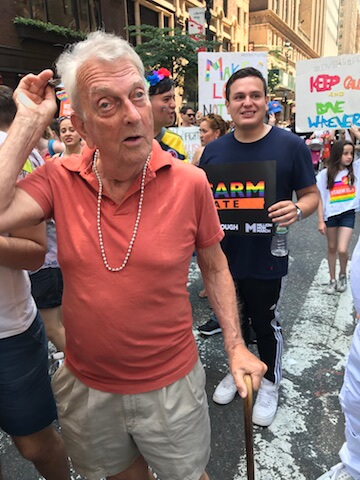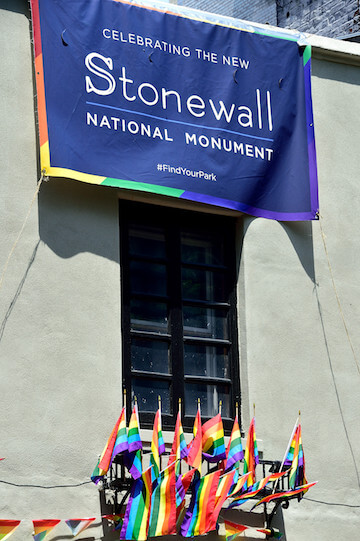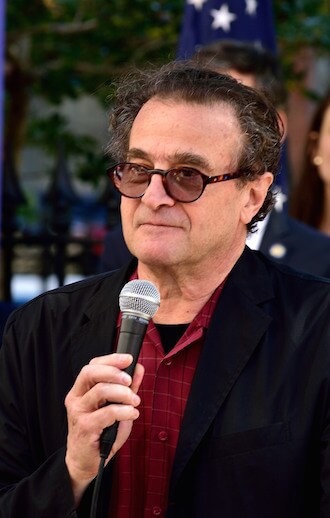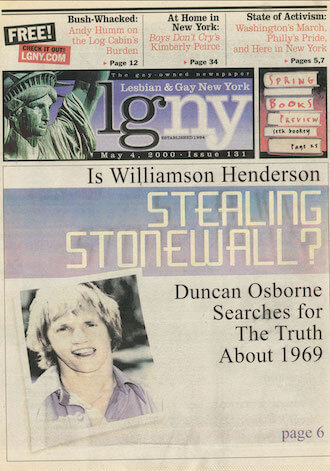Dick Leitsch in the 2017 LGBTQ Pride Parade in Manhattan. | ANDY HUMM
Dick Leitsch, who was president of the gay rights Mattachine Society of New York at the time of the Stonewall Rebellion in 1969 and provided an essential on-the-scene report for Mattachine’s newsletter, died on June 22. His death followed a year-long battle with multiple melanoma that was first diagnosed in his eye and spread to his liver and kidneys. Leitsch, a longtime resident of the Upper West Side, was 83 and died in Manhattan.
Leitsch was the organizer of an intrepid group of early gay activists from Mattachine who sounded the death knell for New York State’s ban on serving alcohol to gay people in bars on April 22, 1966 by staging “Sip-Ins” at several watering holes — identifying themselves as homosexual and asking to be served. On their third try, Leitsch, joined by Randy Wicker, Craig Rodwell, and John Timmons, were denied in view of the press at the West Village’s Julius’, at the time a “raided premises” fearful of being closed.
While LGBTQ people had demonstrated and even rioted before this, the “Sip-In” was the first targeted act of gay civil disobedience and it was successful.
In 1966 civil disobedience, Mattachine pioneer defeated state’s ban on serving alcohol to gays
“The whole thing ended up in court, and the court decided well, yes, the Constitution says that people have the right to peacefully assemble and the state can't take that right away from you,” Leitsch said in a 2008 interview with National Public Radio. “And so the Liquor Authority can’t prevent gay people from congregating in bars.”
The SLA then dropped its regulation that serving gay people made an establishment a “disorderly” venue.
The Stonewall Rebellion accelerated the movement exponentially. Leitsch frequently observed, “Before Stonewall virtually no one was gay. After Stonewall everyone was gay.”
Paul Havern, 28, who has been friends with Leitsch for the past three years, was part of a group of young activists who took an interest in Leitsch and gave him “a late-life Renaissance,” according to Tom Bernardin, the historian of Julius’.
Havern said, “For a lot of us, Dick was sort of a bridge into a world that was really lost to an entire generation. For many of us, he really provided us insight not only on how far our community has come, but also to how similar we all were despite our differences.”
Historian and activist David Carter — whose 2004 book “Stonewall: The Riots That Sparked the Gay Revolution” is the definitive account of the 1969 Rebellion — noting that Leitsch’s activism effectively legalized gay bars and created the expectation on the part of LGBTQ people that they would be legally served, told Gay City News, “Without Dick Leitsch, there would have been no Stonewall.”
A funeral Mass for Leitsch will take place at The Church of St. Mary the Virgin, 145 West 46th Street, at 10 a.m. on Thursday, June 28, which happens to be the 49th anniversary of Stonewall. All are welcome. The funeral will be followed by a brief interment ceremony at St. Luke in the Fields, on Hudson Street at Christopher Street. After the interment, a reception and celebration of his life will be held at Julius’, 159 West 10th Street at Waverly Place, at about 1 p.m.
GayCityNews.nyc will publish a fuller remembrance of Dick Leitsch following his funeral.






































